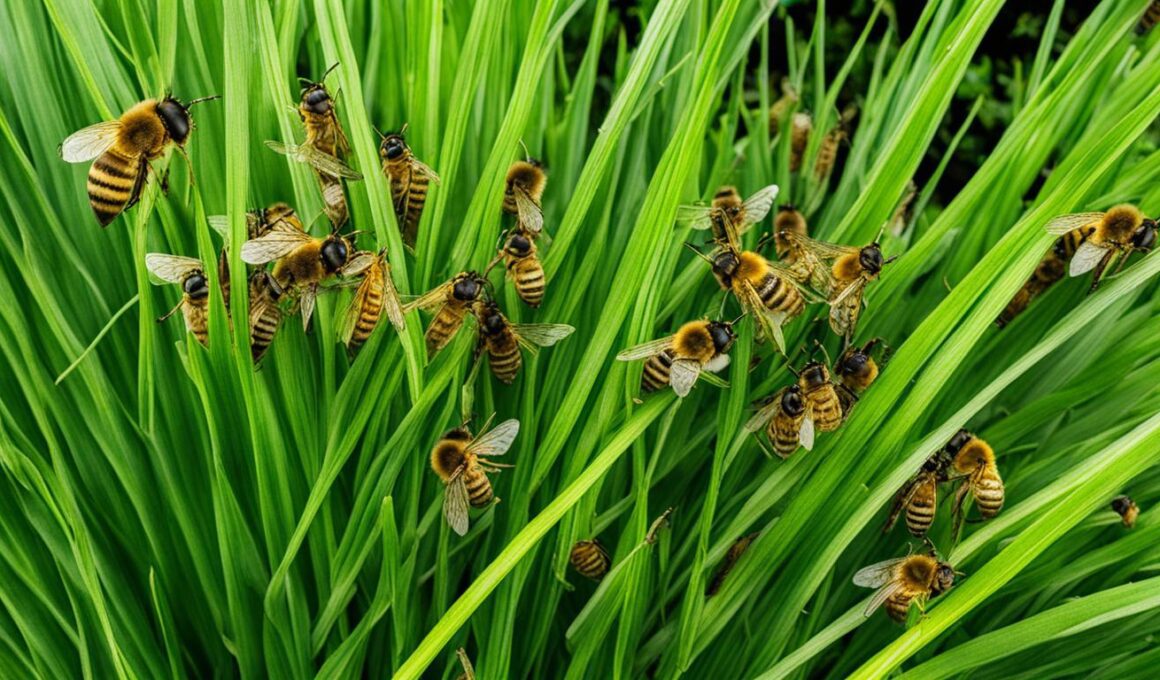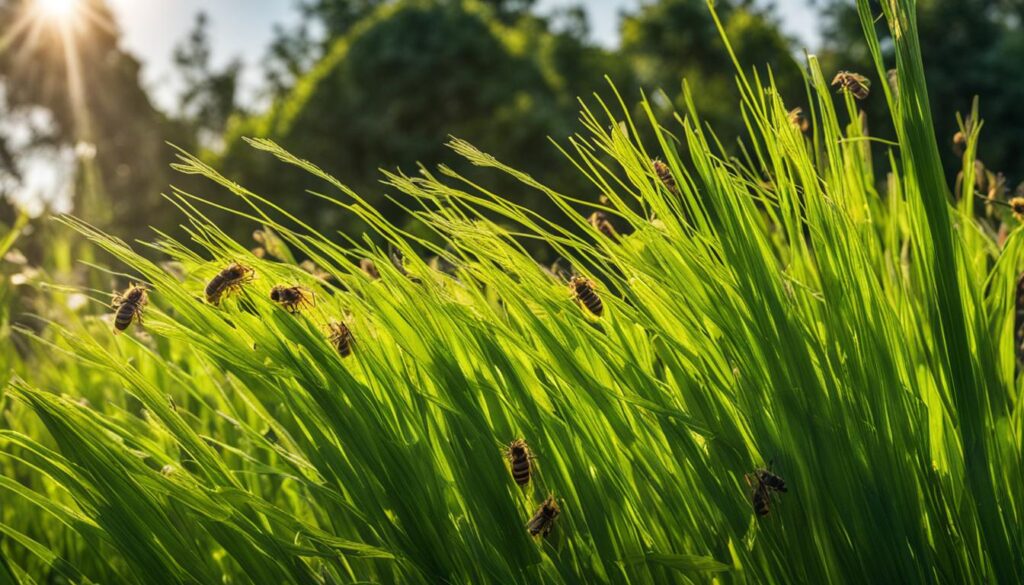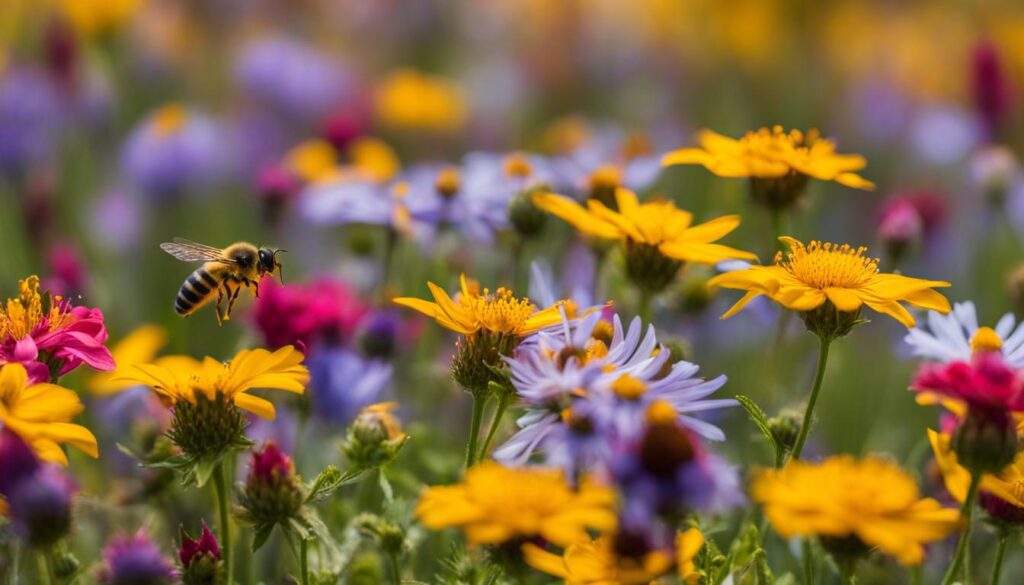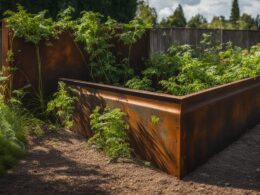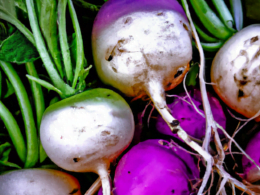Lemongrass, a popular perennial plant, has garnered attention for its potential ability to repel bees. While there is evidence suggesting that lemongrass can repel wasps, the effects on bees are still uncertain. Some sources mention that lemongrass is used in aromatherapy and its scent may attract specialized pollinators. However, further research is needed to determine the specific relationship between lemongrass and bees.
Key Takeaways:
- Lemongrass is classified as a perennial plant that may repel wasps.
- The effects of lemongrass on bees are still unknown.
- Floral scents, including those emitted by lemongrass, play a significant role in plant-pollinator interactions.
- It is important to prioritize the conservation and protection of pollinators.
- Seeking professional assistance is advised when dealing with bees or wasps to ensure their safe relocation.
Do Plants Really Repel Bees?
While the previous section provided some insight into the potential repelling effects of lemongrass on bees, it is important to explore whether other plants can also repel bees. According to a reliable source, there is a list of plants known as wasp repellent plants, which may have a similar effect on bees. Some of these plants are categorized as annuals, while others are perennials. Lemongrass is included in the list of perennial plants that may repel wasps, but it is uncertain whether it can repel bees as well. Therefore, it would be beneficial to further investigate the relationship between specific plants and their potential to repel bees.
Understanding the relationship between plants and their potential to repel bees can be valuable for various reasons. For those who are allergic to bee stings, having plants that naturally deter bees from their surroundings can provide peace of mind and reduce the risk of allergic reactions. Additionally, if you have a garden or outdoor space that you enjoy, knowing which plants may repel bees can help you create a more bee-friendly environment without compromising your comfort or safety.
Plants That May Repel Bees:
- Lemongrass (perennial)
- Mint (perennial)
- Marigold (annual)
- Eucalyptus (perennial)
- Geranium (annual/perennial)
While it is important to note that these plants have the potential to repel bees, it is essential to consider the overall impact on pollinators. Bees play a crucial role in pollination, which is essential for the reproduction of many plants. Therefore, if you decide to incorporate these plants into your outdoor space, it is advisable to provide alternative sources of nectar and pollen to ensure the well-being of bees and other pollinators.
Further research is needed to fully understand the relationship between specific plants and their ability to repel bees. By investigating the effects of various plants on bee behavior and studying the chemical compounds responsible for repelling bees, scientists can provide more accurate and comprehensive information on this topic. This research can help individuals make informed decisions when it comes to choosing plants for their gardens and outdoor spaces, promoting a balance between creating a bee-friendly environment and addressing personal preferences or concerns.
The Role of Floral Scents in Plant-Pollinator Interactions
Floral scents are not just a pleasant fragrance; they play a vital role in plant-pollinator interactions. When it comes to attracting pollinators for reproduction, plants release organic volatile compounds, including essential oils. These compounds serve as chemical signals, guiding pollinators towards the flowers. The scent of a flower is a complex mixture of many volatile compounds, which can vary based on factors such as the plant’s genotype and local environmental conditions.
Essential oils derived from various plants have shown specific pollinator preferences. For example, ylang ylang essential oil, commonly used in aromatherapy, has a unique fragrance that attracts specialized pollinators such as moths and beetles. This highlights the intricate relationship between plants and their pollinators, as different floral scents can target specific insect species for successful pollination.
Understanding the role of floral scents in plant-pollinator interactions is crucial for both researchers and enthusiasts. By unraveling the specific compounds and their effects on pollinators, scientists can gain insights into the intricate mechanisms that drive these interactions. This information can further aid in the conservation and restoration of pollinator populations, ensuring the health and resilience of ecosystems.
Using Soapy Water to Remove Bees or Wasps
If you are facing a small nest of bees or wasps outside your home that needs to be dealt with, there is a method you can try before seeking professional help. Using a solution of soapy water can effectively destroy the nest and eliminate the insects.
Soap acts as a surfactant, which means it breaks down the surface tension of water and allows it to penetrate the waxy coating on the insects’ bodies. When the soapy water comes into contact with the bees or wasps, it essentially suffocates them. This method is considered a last resort and should only be used when you have exhausted other options.
Here’s how you can safely use soapy water to remove bees or wasps:
- Wear protective clothing: Before attempting to remove the nest, make sure to wear long sleeves, pants, gloves, and a beekeeping veil or hat to protect yourself from potential stings.
- Mix the solution: In a large bucket, mix a few tablespoons of liquid dish soap with water. The exact ratio may vary, but a good guideline is to use about 1 tablespoon of soap for every quart of water.
- Approach the nest: Carefully approach the nest during the early morning or late evening when the bees or wasps are less active. Slowly pour the soapy water into the nest entrance, making sure to saturate it thoroughly.
- Observe from a safe distance: After applying the soapy water, step back and observe the nest from a safe distance. The soap will interfere with the insects’ ability to fly, causing them to drown. It may take some time for all the bees or wasps to perish.
- Dispose of the nest: Once you are confident that the nest is no longer active, safely remove and dispose of it. Seal it in a plastic bag and throw it in the trash to prevent any potential resurgence.
It is important to note that this method should only be used if absolutely necessary, as it can have an impact on beneficial pollinators like bees. Before resorting to using soapy water, consider seeking the assistance of a local beekeeper or specialist who can safely relocate the bees or wasps without causing harm to them or other pollinators.
Conclusion
In conclusion, the question of whether lemongrass repels bees remains unanswered. While there is some evidence suggesting lemongrass may repel wasps, its impact on bees is still unclear. Floral scents, including those emitted by lemongrass, are known to play a significant role in plant-pollinator interactions. However, further research is needed to determine the specific effects on bees.
It is crucial to prioritize the conservation and protection of pollinators, as they are vital for plant reproduction and overall ecosystem health. When dealing with bees or wasps, it is advisable to seek the assistance of professionals who can safely relocate the insects. Taking measures that may harm beneficial pollinators should be avoided whenever possible.
Understanding the relationship between plants, pollinators, and their scents is essential for creating a harmonious environment that supports both plant growth and the well-being of bees. By continuing to study the potential impacts of lemongrass and other plants on pollinators, we can make informed decisions that promote a balance between our needs and the needs of these essential creatures.
Can Baking Soda Repel Bees Like Lemongrass?
Some people believe that baking soda’s effect on plants can repel bees, similar to how lemongrass does. However, there is no scientific evidence to support this claim. Baking soda is commonly used for cooking and cleaning, while lemongrass is known for its natural insect-repelling properties.
FAQ
Does lemongrass repel bees?
While lemongrass has been suggested to repel wasps, there is limited information available specifically regarding its impact on bees. Further research is needed to determine the specific effects of lemongrass on bees.
Do plants repel bees?
Some plants are known to repel wasps, but it is uncertain whether the same plants can also repel bees. Further investigation is needed to understand the relationship between specific plants and their potential to repel bees.
What role do floral scents play in plant-pollinator interactions?
Floral scents, including those emitted by plants like lemongrass, play a crucial role in attracting pollinators for reproduction. These scents release organic volatile compounds, including essential oils, which can vary depending on factors such as genotype and local environmental conditions.
How can I remove bees or wasps using soapy water?
For small nests located outside the home, a solution of soapy water can be used to destroy the nest. Soap acts as a surfactant, allowing water to penetrate the insects’ bodies and essentially drowning them. However, it is recommended to seek the assistance of professionals for the safe removal of bees or wasps.
What should I do if I have a nest of bees or wasps?
If you have a nest of bees or wasps that needs to be removed, it is best to seek the assistance of a local beekeeper or specialist who can safely relocate the insects. They have the knowledge and equipment to remove the nest without harming beneficial pollinators.





